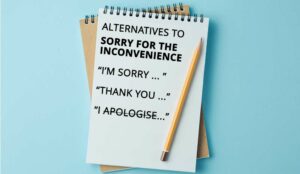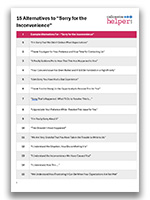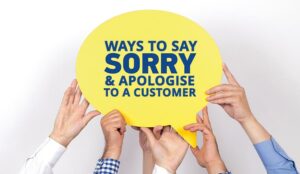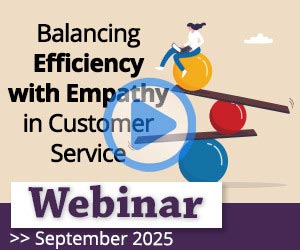Sometimes, “Sorry for any inconvenience caused” just doesn’t cut it. Customers want more than a generic apology – they want to feel heard, understood, and reassured that the issue won’t happen again.
So, we asked our readers what they say in their contact centres to deliver a more empathetic and meaningful response. Here are 15 alternative phrases that can help you turn an apology into a positive customer experience.
Another Way to Say “Sorry for the Inconvenience”
1. “I’m Sorry That We Didn’t Deliver/Meet Expectations”
I would be more inclined to say… I’m sorry that we didn’t deliver/meet expectations with X and that it meant that A, B, C was difficult for you.
I think it shows that you have listened. I also think it makes it clear that you have tried to offer a solution that avoids A, B or C happening again. At the very least it is an opening to explain where the customer journey went wrong.
If it takes the path of a GWG (good will gesture) then the context is that it’s relevant to the problem and not just a throwaway, random gesture.
2. “Thank You Again for Your Patience and Your Time for Contacting Us”
Thank you again for your patience and your time for contacting us and definitely, we are at your service.
The customer is looking to see that things have been solved, but also to raise the concern that it won’t happen again in the future.
3. “It Really Saddens Me to Hear That This Has Happened to You”
This phrase adds a personal and empathetic touch, showing the customer that their experience genuinely matters to you.
By acknowledging their feelings, you create a stronger connection and reassure them that their concern is being taken seriously.
4. “Your Concern/Issue Has Been Noted and It Will Be Handled on a High Priority”
This response confirms to the customer that their issue has been acknowledged and is being actively addressed. Emphasising its priority helps build trust and demonstrates a commitment to swift resolution.
5. “I Am Sorry You Have Had a Bad Experience”
I am sorry you have had a bad experience but you are through to me now so let me do all I can to resolve your issue.
This phrase expresses genuine empathy by directly addressing the customer’s negative experience. It acknowledges their feelings, making them feel understood and giving them confidence that you’re committed to improving their situation.
6. “Thank You for Giving Us the Opportunity to Resolve This for You”
I tend to say “thank you for giving us the opportunity to resolve this for you”, “thank you for bringing this to our attention”, “we appreciate the time you have taken to tell us about your concern and for giving us the opportunity to put things right”
7. “Sorry That’s Happened. What I’ll Do to Resolve This Is…”
“Sorry that’s happened. What I’ll do to resolve this is…” really helps customers feel confident that the agent will help them.
This response immediately shows accountability and offers a solution, which can help the customer feel more at ease. By focusing on what actions will be taken, it shifts the conversation toward resolution and demonstrates a proactive approach.
8. “I Appreciate Your Patience While I Resolve This Issue for You”
I appreciate your patience whilst we have worked to resolve this issue/query for you.
This phrase acknowledges the customer’s patience, which helps validate their effort and time spent. It also highlights that you are actively working on a solution, fostering a sense of progress and care.
9. “I’m Really Sorry About X”
I’m really sorry about X, and thank you for letting me know about it. It’s not the level of service we want any of our customers to receive and I hope you understand that from your past experience with us. What I’m going to do for you is…
10. “This Shouldn’t Have Happened”
This shouldn’t have happened. Here’s a discount code and we’ll work super hard to do better next time.
This statement takes full ownership of the issue, showing the customer that you recognise the situation shouldn’t have occurred.
11. “We Are Very Grateful That You Have Taken the Trouble to Write to Us”
We are very grateful that you have taken the trouble to write to us about your concerns and we are sorry if we have inadvertently caused any upset.
We truly accept your insights as we are always looking for ways in which our service can be improved.
12. “I Understand the Situation, How Discomforting It Is”
I understand the situation, how discomforting it is, I would feel it too… Always try to establish statements to make it more empathetic.
To find out more about empathy in customer service, read our article: 26 Great Techniques for Showing Real Empathy in Customer Service
13. “I Understand the Inconvenience We Have Caused You”
I understand the inconveniences we caused you and I thank you very much for your patience and understanding. (Please accept my sincerest apologies for xxx). Meanwhile, I already did xxx and I will also do xxx…
Positive voice tone, taking ownership, willingness to help, and showing the client/partner/colleague we have already started taking actions to fix the issue can have a positive impact on recovering the situation.
14. “I Understand How This …”
How about just an acknowledgement of the problem; “I understand how this X, Y and Z”, and then solve it. “Let me show/tell you how I can help you get this sorted out” – or something similar.
I personally dislike the insincere “Sorry for…” or “We apologize”. I don’t believe the person on the other end when they say that. However, when they understand and then tell me they are there to help it’s another thing altogether.
15. “We Understand How Frustrating It Can Be When Your Expectations Are Not Met”
We usually recommend an empathetic response. Something along the lines of “We understand how frustrating it can be when your expectations are not met. Outside of work, I’m a customer too. I just want to thank you for your patience and understanding while we got this resolved for you today.”
The acknowledgement of the emotional state of the customer goes a long way (especially with NPS or CSAT).
Printable Download – 15 Alternatives to “Sorry For the Inconvenience Caused”
Do you want to download this to share with your team?
Get your free download of 15 Alternatives to “Sorry for the Inconvenience Caused” now:
Tips to Maximise Your Apologies
Use “Sorry” Not “Apologize”
I always prompted our advisors to use ‘Sorry’ instead of the word ‘Apologize’ because I find ‘Sorry’ comes across with more empathy.
I think it is mostly in the way it is said but would add that you say it as you would say it to a child or elderly relative.
I’d personally appreciate “I’m sorry we didn’t hit the mark. Let me know how I can help to ensure it doesn’t happen again” over “I apologize for the inconvenience caused”.
Use a Deeper Tone of Voice
Be careful. Being sorry with a weak voice tone or using fake “sorry” just to get rid of the situation will get most customers angrier and generally not satisfied. A deep tone of voice, honest & clear speaker always will nail the situation.
Be Truly Empathetic. Don’t Just Say Words Which ‘Read’ Right
The way the sentence is said is as important, if not more so, than the words used in the sentence.
Be truly empathetic. Don’t just say words which ‘read’ right. I’ve calibrated calls with teams and this has on occasions been challenging for teams to understand this aspect.
The words matter to a point, but it’s whether or not the way they are translated by the person being spoken to is authentic that is more important. This is why truly listening is so important in delivering good customer experience. Obviously, it also helps if you resolve the issue being raised as well!
If you want to improve the empathy skills of your contact centre staff, read this article next: How to Coach Empathy in the Contact Centre – With Three Training Exercises
Don’t Give a Bland Apology
Why not apologize for what went wrong or didn’t happen – be specific and give an explanation. Don’t give a bland apology for the consequence, i.e. the inconvenience, annoyance, disappointment etc.
Words Like “Sorry, Apologize, Understand …” Are Not Recommended Any More
Today, words like “sorry”, “apologize” and “understand” are not recommended to be used any more.
But phrases that validate or recognize their emotions (omitting the ones mentioned above) work well followed by either an action plan or educating CX.
Don’t Use the Word “We”
If there’s one thing I cannot abide from an agent, it is the use of the word “we”. How about I am sorry for the delay, I am going to look into this for you (or whatever).
“We are sorry” – who’s we? Karen from accounting isn’t dealing with the call so how can she be as sorry as you are? “We” doesn’t cut it.
Empower your agents to take ownership and provide them with the tools and authority to make the situation right.
To discover more about customer service apologies, read these articles next:
- 16 Customer Service Apology Statements
- Customer Service Apologies – Keeping Sorry Fresh and Sincere
- “Sorry for the Inconvenience” – How to Offer a Genuine Apology
Author: Jonty Pearce
Reviewed by: Hannah Swankie
Published On: 14th Jun 2022 - Last modified: 13th Oct 2025
Read more about - Customer Service Strategy, Apologies, Empathy, Free Downloads, Handling Customers, Language, Service Strategy

















